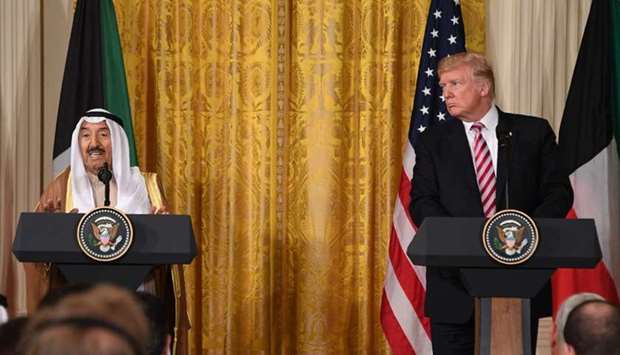Hours after a call between His Highness the Emir Sheikh Tamim bin Hamad al-Thani and Saudi Crown Prince Mohamed bin Salman hinted at a thaw in strained relations among GCC member-states, the official Saudi news agency SPA announced Riyadh was suspending "any dialogue or contact" with Qatar and accused Doha of "distorting facts".
The reaction came after the official Qatar News Agency (QNA) reported that Sheikh Tamim and Mohamed bin Salman agreed in a phone conversation, co-ordinated by Trump late Friday, to assign two envoys to resolve the diplomatic crisis.
"What the Qatari news agency reported is unrelated to the truth and continues the Qatari authorities' distortion of facts," SPA said, citing an unnamed Saudi official.
QNA said that the conversation between both leaders, based on the co-ordination of the US president, stressed the need to resolve the crisis "by sitting down to the dialogue to ensure unity and stability of the GCC countries."
The development came after Trump on Friday spoke separately with the leaders of Saudi Arabia, Qatar and the UAE.
The conversation between the Emir and Mohamed bin Salman was the first such contact between leaders of both countries since Saudi Arabia, the UAE, Bahrain and Egypt severed diplomatic ties and transport links on June 5 with Qatar, accusing it of supporting terrorism, a charge that Doha denies.
Qatar has also rejected a list of 13 demands presented by the four countries in order to end their boycott, calling the demands an infringement on its sovereignty.
The demands included downgrading ties with Iran, the cessation of support for Islamist groups and the closure of Doha-based broadcaster Al Jazeera.
Saudi Arabia, the UAE, Bahrain and Qatar are members of the Gulf Co-operation Council (GCC), a traditional US ally.
According to Saudi-owned television Al Arabiya, Qatar's Emir expressed in the Friday conversation his interest in resolving the crisis in order to achieve the best outcome for all states involved. "The Saudi Crown Prince is to discuss how to proceed with the Saudi-led bloc," according to the report.
The sudden change of mind on the Saudi part seems to be an attempt to sabotage the good intentions of Qatar and thus prolong the crisis, a position that is not good for any of the parties, a Doha-based observer said.
On Thursday, Trump said he would be willing to mediate the dispute between Qatar and the Saudi-led bloc.
"The president underscored that unity among the United States' Arab partners is essential to promoting regional stability and countering the threat of Iran," the White House said.
"The president also emphasised that all countries must follow through on commitments... to defeat terrorism, cut off funding for terrorist groups, and combat extremist ideology."
When he offered to mediate, Trump said he believed the dispute could be solved "fairly easily".
Kuwait, another GCC country, has been mediating the ongoing crisis, one of the most serious in the region in recent years.
Despite the deadlock, some observers said the telephone call between the Qatari and Saudi rulers itself was a sign that tensions were dissipating.
"The fact that the telephone call took place and the offer of dialogue was made is significant in itself," said Kristian Ulrichsen, a fellow at the Baker Institute for Public Policy at Rice University.
Qatar hosts a huge US air base, home to the headquarters of Centcom -- the regional command which leads operations against the Islamic State militant group.

US President Donald Trump (R) looks on as Kuwaiti Emir Sheikh Sabah al-Ahmad Al-Sabah speaks during a joint press conference at the White House in Washington , DC, on September 7, 2017. The two leaders earlier had held discussions on resolving the Gulf crisis.
Hope of a breakthrough in the three-month-old Gulf crisis following US President Donald Trump's latest initiative has been snuffed out after Saudi Arabia falsely accused Qatar of "distorting facts" and announced suspension of further contacts early Saturday.


